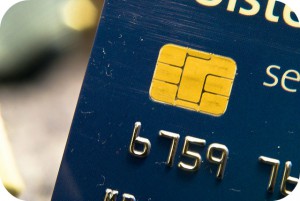F or the last few months Americans have been confronted with a peculiar dilemma at the cash register: to swipe or not to swipe? That is the question as shoppers and businesses across the country struggle to adapt to the credit card industry’s transition to chip technology. While 75 percent of cards are currently chip-enabled, only one-quarter of American merchants have the equipment to read them. The frustration continues even after upgrading as customers endure long waits for payments to process as well as irritating beeping noises.
or the last few months Americans have been confronted with a peculiar dilemma at the cash register: to swipe or not to swipe? That is the question as shoppers and businesses across the country struggle to adapt to the credit card industry’s transition to chip technology. While 75 percent of cards are currently chip-enabled, only one-quarter of American merchants have the equipment to read them. The frustration continues even after upgrading as customers endure long waits for payments to process as well as irritating beeping noises.
The shaky chip card rollout has left many people wondering why the switch had to happen in the first place. According to experts, improved security is the simple answer. “You can’t counterfeit a chip card,” said Jason Oxman of the Electronic Transactions Association, a trade group for the payment industry. “You can very easily counterfeit a strip card.” The chips also keep transactions secure by communicating with banks through unique codes that are generated for a single use and then deleted. However, this sophisticated messaging system is precisely what leads to the long processing times that many customers complain of. Industry insiders say that new software is coming down the pipeline that will soon speed up the process.
Still, experts can’t do much to make the transition smoother for businesses. While companies are not legally required to switch to chip card readers, as of October 2015 those who fail to adapt will no longer receive liability protection from banks. That means any fraud or data breaches they face would be the company’s problem alone to deal with. A report by a major financial research group found that this method confused companies further and that a straightforward mandate would have been more efficient. But even companies that upgraded on time are still swiping cards thanks to delays in certifying their registers. This process can take months to accomplish, leading to checkout stations equipped with chip technology that cannot be used. As with the slow processing speeds, experts say the certification system should improve in the near future.
One thing that won’t change, though, is that high-pitched beep that screeches at you after completing a purchase. “The loud, annoying beep that you’re referring to is to remind you to take the card out,” said Oxman. “The goal of the noise is to get your attention, and it sounds like it’s working.”
Questions:
- Would a government mandate have caused companies to transition quicker to chip card technology?
- Will consumer frustration with chip cards eventually fade?
Sources: Karen Workman, “Confused by Chip Cards? Get in Line,” The New York Times, August 5, 2016; Ian Kar, “The Chip Card Transition in the U.S. Has Been a Disaster,” Quartz, July 29, 2016. Photo by Ciaran McGuiggan.
